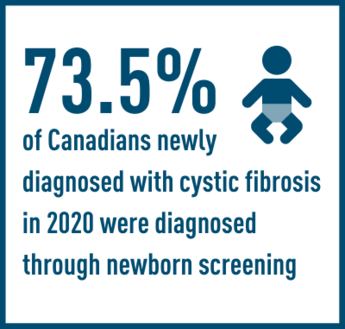CYSTIC FIBROSIS CANADA CELEBRATES APPROVAL OF LIFE-CHANGING CF DRUG FOR 152 RARE MUTATIONS, EMPHASIZES NEED FOR ACCESS FOR THOSE STILL LEFT BEHIND.
F508del, 2789+5G->A, 3272-26A->G, 3849+10kbC->T, 711+3A->G, A1067T, A455E, D110E, D110H, D1152H, D1270N, D579G, E193K, E56K, F1052V, F1074L, G1069R, G1244E, G1349D, G178R, G551D, G551S, L206W, P67L, R1070Q, R1070W, R117C, R117H, R347H, R352Q, R74W, S1251N, S1255P, S549N, S549R, S945L, S977F, A46D, G85E, L1077P, M1101K, N1303K, R347P, G1061R, L165S, Y563N, V456A, V456F, I502T, H139R, G480C, H1085R, 3141del9, E474K, W361R, H1085P, W1098C, Y161D, G27R, G463V, S13F, G628R, P5L, L1335P, Q98R, A349V, V201M, F311L, A1006E, D443Y, R117G, F575Y, S1159F, F1099L, S912L, I618T, L967S, Q1291R, 546insCTA, G622D, R334L, G126D, T1036N, G970D, F311del, S1159P, E116K, R117L, Y109N, E60K, H1375P, L346P, M265R, R933G, E588V, F191V, R352W, V1153E, W1282R, D924N, F1016S, I1366N, I601F, M952I, M952T, Q237E, R117P, R258G, A120T, G194R, I980K, L1324P, Q237H, A234D, D192G, D979V, G314E, R347L, V1240G, Y161S, G194V, I1269N, R1283S, A554E, D614G, E92K, H1054D, I336K, P205S, T338I, S341P, S492F, R1066H, R334Q, P574H, Q359R, S737F, L15P, R1283M, V232D, G1249R, L453S, E822K, Y1032C, L1480P, H199Y, R74Q, S364P, R74W;V201M;D1270N*, R74W;D1270N*, D443Y;G576A;R668C*, R74W;V201M*, F508C;S1251N*
*complex alleles with multiple mutations in the same copy of the CFTR gene.
TORONTO, July 17, 2024 – Cystic Fibrosis Canada is encouraged by a recent decision by Health Canada to approve the life-changing cystic fibrosis (CF) drug Trikafta for some living with rare mutations that lead to CF. This decision could make it easier for close to 300 Canadians who have at least one of the now approved 152 genetic mutations to access the drug. Trikafta is already approved for those with at least one F508del gene mutation, the most common mutation in Canada.
Health Canada’s recent decision is a significant advancement, expanding approval to highly effective modulator therapy to approximately 240 Canadians with one of 142 mutations that previously lacked therapy options. Notably, this approval includes five mutations not recognized by the FDA in the United States, bringing this drug to over 60 Canadians with these specific mutations. Additionally, around 60 Canadians with one of 10 mutations already approved for Kalydeco, an earlier cystic fibrosis therapy, will now be a step closer to this new treatment.
However, Health Canada’s decision is not without its limitations. The indication excludes 30 mutations approved by the FDA in the United States, potentially preventing about 12 Canadians with these mutation from accessing this therapy. Furthermore, there are over 175 Canadians with rare mutations for whom the benefits of Trikafta remain unknown. This decision continues to deny the opportunity these individuals to try the drug.
While Trikafta’s potential benefits have been recognized in more Canadians with cystic fibrosis, it comes years after other countries approved or are considering expanding approvals for the use of Trikafta in people with even more rare genetic mutations or have enacted right-to-try models for those who may benefit.
“This recent expansion is a promising step for Canadians with cystic fibrosis, but it still leaves many people behind,” shared Kelly Grover, President and CEO, Cystic Fibrosis Canada. “Canadians with rare mutations have watched people just like them get access in other countries, and some of these countries are considering further expansion. Health Canada is falling behind when it could be leading the way.”
With the approval of Trikafta for an additional 152 mutations in Canada, the next step is for Canada’s Drug Agency (CDA) and Quebec’s Institut national d'excellence en santé et en services sociaux (INESSS) to recommend that public drug plans fund Trikafta for those living with these recently approved mutations, and for private payers to expand access to include people with these mutations. Until drug plans fund Trikafta more broadly, Canadians with these mutations remain in a state of uncertainty, waiting to access the treatment they need.
Dr. Paul Eckford, Chief Scientific Officer, Cystic Fibrosis Canada emphasized, “We call on CDA and INESSS to move swiftly to recommend funding. However, provincial and territorial governments should not wait for these decisions to act, nor should private drug plans. They have the power to fund Trikafta now for these additional genetic mutations and must do so today to prevent further delays in treatment for those who need it.” Cystic Fibrosis Canada continues to advocate for access and funding of Trikafta for all who could benefit and is encouraging people to show their support by writing to their provincial or territorial elected officials, asking for people with rare mutations that may respond to Trikafta to be given the right to try the drug. Additionally, Cystic Fibrosis Canada remains committed to working with public drug programs and private insurers to expand access and alleviate the financial challenges faced by those living with cystic fibrosis.
As Cystic Fibrosis Canada prepares to intensify advocacy efforts, your support is now more vital than ever. Join us in advocating for unrestricted access to Trikafta for all who may benefit by raising your voice and sending a letter to your elected official right now. Demand that every Canadian with cystic fibrosis, regardless of their mutation type, gets the chance to live a life W/O Limits. Help us ensure that the phrase "terminal disease" becomes a thing of the past.




